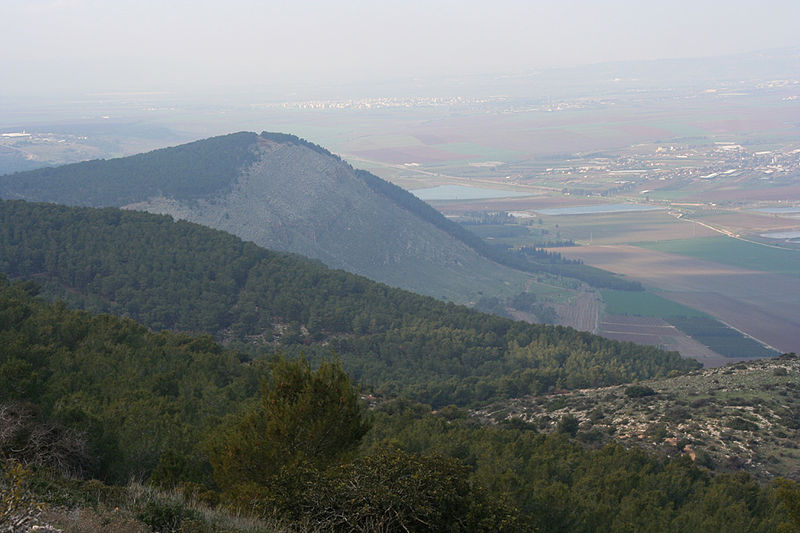26 July. Jonathan is killed and Saul takes his own life
“The Philistines fought against Israel, and the Israelites ran away from them. Many Israelites were killed on Mount Gilboa. The Philistines fought hard against Saul and his sons, killing his sons Jonathan, Abinadab and Malki-Shua.”
“The fighting was heavy around Saul. The archers shot him, and he was badly wounded. He said to the officer who carried his armour, ‘Pull out your sword and kill me. Then those uncircumcised men won’t make fun of me and kill me.’ But Saul’s officer refused, because he was afraid.”
“So Saul took his own sword and threw himself on it. When the officer saw that Saul was dead, he threw himself on his own sword, and he died with Saul. So Saul, his three sons and the officer who carried his armour died together that day.”
“When the Israelites who lived across the Jezreel Valley and those who lived across the Jordan River saw how the Israelite army had run away, and that Saul and his sons were dead, they left their cities and ran away. Then the Philistines came and lived there.”
“The next day when the Philistines came to take all the valuable things from the dead soldiers, they found Saul and his three sons dead on Mount Gilboa. They cut off Saul’s head and took off his armour. Then they sent messengers throughout all the land of the Philistines to tell the news in the temple of their idols and to their people.”
“They put Saul’s armour in the temple of the Ashtoreths and hung his body on the wall of Beth Shan.”
“When the people living in Jabesh Gilead heard what the Philistines had done to Saul, the brave men of Jabesh marched all night and came to Beth Shan. They removed the bodies of Saul and his sons from the wall of Beth Shan and brought them to Jabesh.”
“There they burned the bodies. They took their bones and buried them under the tamarisk tree in Jabesh. Then the people of Jabesh gave up eating for seven days.”
(1 Samuel 31:1-13)

While David was fighting the Amalekites who had destroyed Ziklag, the Philistines attacked and defeated the Israelites at Mount Gilboa. Jonathan and two other sons of Saul were killed in the battle (see 18 on the map on 8 July).
Facing capture, Saul took his own life. His body was fastened to the city walls at Beth Shean by the Philistines and his armour was displayed inside the Temple of Ashtoreth (see 19 on the map).
Saul’s body was rescued by the men of Jabesh Gilead who lived across the River Jordan in the Wadi al-Yabis (see 20 on the map). They burned the mutilated bodies of Saul and his sons, and buried their ashes at Jabesh Gilead.
The downfall of Saul and his ignominious death came quickly after he abandoned God’s ways (see 1 Samuel 15:17-23). It’s often not realised that the reign of King Saul was very brief and lasted only a little less than two years.
David fell out of favour with Saul almost as soon as he had killed the Philistine champion Goliath (see 1 Samuel 18:6-12) and he went to serve the Philistine King Achish of Gath as a mercenary soldier within months of escaping from Saul. 1 Samuel 27:7 tells us, “David lived in the Philistine land a year and four months.” (This employment of a little over a year is confirmed by the Philistine king in 1 Samuel 29:3.)
English translations of 1 Samuel 13:1 usually say Saul “was king over Israel for 42 years” (but often have a footnote saying this figure is unreliable). However, the word ‘forty’ does not appear in the original Hebrew of the Tanakh – the Hebrew Bible. The word ‘forty’ was only added hundreds of years later to a few late manuscripts of the Septuagint – the Greek translation of the Hebrew Scriptures used by the New Testament church in the 1st century AD. This explains why Paul in Acts 13:21, using a convenient round number, says – quoting the Septuagint – that Saul “was king for 40 years”.
Many people find it difficult to reconcile David becoming King of Judah on the death of Saul only two years after defeating Goliath because they have been taught that David was only a young boy when he killed Goliath; but we have already seen (on 10 July) that the Bible does not say that David was a boy, although both Saul and Goliath thought he was young and inexperienced (see 1 Samuel 17:33 & 42). We’re actually told that David was “a brave man and a warrior”, and a “fine-looking man” who had killed a bear by seizing its fur and striking it dead (see 1 Samuel 16:18 & 17:35). In reality he was a “young man” (1 Samuel 17:58) who had already served as Saul’s armour bearer (1 Samuel 16:21) and became the commander of 1,000 soldiers immediately after his defeat of Goliath (see 1 Samuel 18:13).
The photo (by Beivushtang) shows Mount Gilboa and the Jezreel Valley.
You can read more about Beth Shean @ https://www.thebiblejourney.org/biblejourney2/30-israel-becomes-a-kingdom-under-saul-and-david/saul-is-killed-by-the-philistines-at-mt-gilboa/
